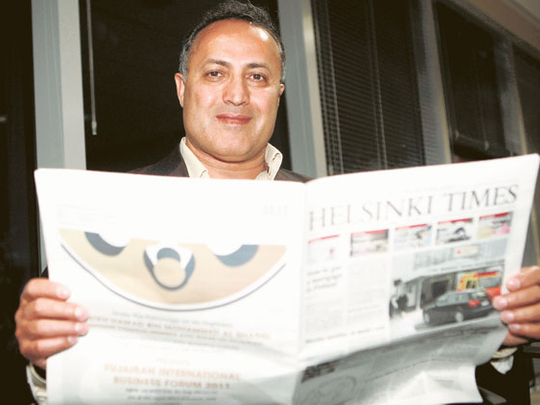
Dubai: Alexis Kouros values the online presence of his newspaper, Helsinki Times.
But the editor-in-chief certainly isn't banking on digital provision of stories to increase profits at the national weekly newspaper launched in April 2007.
Any expansion of the Helsinki Times — to become the only English language daily newspaper in Finland — would be on the print side because, so far, it's making the lion's share of profits.
"In the industry, every-one has almost agreed that newspapers are dying and online is coming — I don't agree with that," said Kouros. "There is hope."
Helsinki Times has enjoyed rapid growth in the past four years and has reached break-even, a rarity in newspapers which usually require five years to move into the black.
With a circulation of 15,000 and a readership of 37,000, Kouros said the newspaper's online edition gets about 3,000 hits a day from its loyal English readers.
Readership has gone up 35 per cent each year since the launch as a newspaper for English expatriates in a country of five million people.
Kouros believes the print edition of the paper is the focal point at which subscribers see it as a branded product compared to online news stories.
"I think a printed newspaper is a product, you buy it, it's yours," Kouros said.
"I think there is a long way that digital newspapers will have to go to be as flexible as paper.
"My advice is that you shouldn't accept the notion that online will swipe away newspapers."
Pundits, he said, have long predicted that radio and TV would doom newspapers much akin to bloggers and new media types today who believe that traditional newspaper will give way to the digital tidal wave.
Kouros attributes the latest doom-and-gloom predictions to a confusion of roles for both print and digital media.
Rightful place
"Now it's an era of confusion for advertising; I think it will settle," he said.
"We have to accept that print is not a breaking news medium.
"It's background and in-depth analysis. Online is now the breaking news medium. When we accept these roles, there is no conflict in my opinion."
When each finds its rightful place in the future, Kouros said online will have an immense reach with newspaper readers because it does some things far better than print due to the immediate and interactive capabilities of electronic communication.
"Interactivity is the key issue online and there are services that are much more natural to be online such as classifieds. These are the strengths of online media."
The big challenge, regardless of dead-tree versus online arguments, is to continue to attract news readers and convert readership growth into revenue, he said.
Helsinki Times will move forward using both in concert to offer alternatives for its readers.
"Our next step is to get more and more subscribers. We are improving our print and online editions."
Media's status: Alive and kicking
According to the World Association of Newspapers' 2010 report, newspapers are alive and well in the face of a growing electronic revolution.
The association said that "contrary to conventional wisdom, newspapers remain a large and thriving industry worldwide, despite the impact of the global recession and the rise of digital media."
Christoph Reiss, CEO of World Association of Newspapers and News Publishers, said the outlook is good as the world's newspapers find more solid ground on the heels of the recession in 2009.












